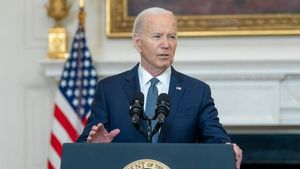YOGYAKARTA - Professor of the Faculty of Veterinary Medicine, Universitas Gadjah Mada (FKH UGM) Prof Wayan Tunas Artama hopes that the public will not worry too much about the monkeypox case which had plagued England in May 2022.
"Education and increasing public awareness of risk factors can be used as the main strategy to reduce exposure to the monkeypox virus," he said in Yogyakarta as reported by Antara, Monday, June 6.
According to him, prevention efforts can be done by avoiding direct contact with people with monkeypox symptoms.
Symptoms of monkeypox in humans, he said, are similar to smallpox, including fever above 38.5 degrees Celsius, weakness, chills with or without sweating, sore throat and cough, aches, swollen lymph glands, and headache.
This is followed by the appearance of a well-defined macular-papular rash, vesicular, pustular, to scab lesions.
"The incubation period for monkeypox ranges from six to 13 days," he said.
He explained that monkeypox is a zoonotic disease that is transmitted from animals to humans when consuming or having direct contact with infected animals.
Monkeypox, he said, was transmitted through various types of wildlife from rodents such as rats and squirrels to primates, namely monkeys and monkeys.
Transmission by direct contact, he said, can also occur between animals.
"The transmission of monkeypox from human to human is mainly through respiratory droplets, which generally require prolonged close contact," he said.
Transmission, he said, could also be through direct contact with body fluids or material from smallpox lesions and indirect contact with contaminated objects or surfaces.
According to him, people can take precautions by regularly washing their hands with soap or hand sanitizer, wearing masks, practicing safe sex, and applying proper coughing and sneezing etiquette.
Seeing the high transmission of monkeypox between humans, Wayan called for surveillance activities to be focused on health facilities targeting cases and probable groups.
In addition, reflecting on the monkeypox outbreak in the United States in 2003, he stressed that restrictions and animal transportation needed to be considered and tightened, especially from endemic areas and countries with the outbreak.
"Meanwhile, animals suspected of having been in contact with infected animals need to be quarantined and handled according to prevention standards and observed monkeypox symptoms for 30 days," said Wayan Tunas Artama.
The English, Chinese, Japanese, Arabic, and French versions are automatically generated by the AI. So there may still be inaccuracies in translating, please always see Indonesian as our main language. (system supported by DigitalSiber.id)











